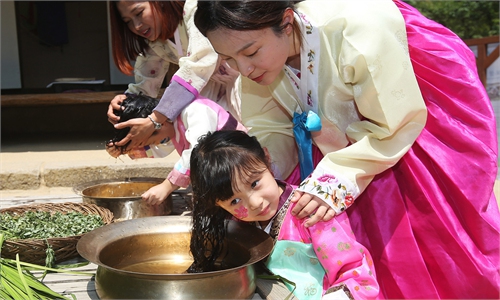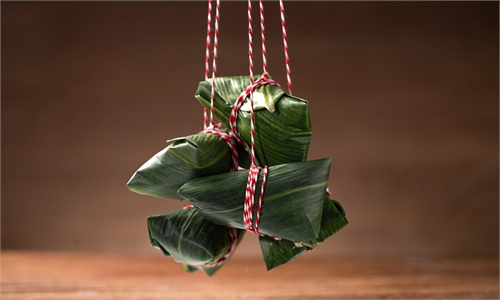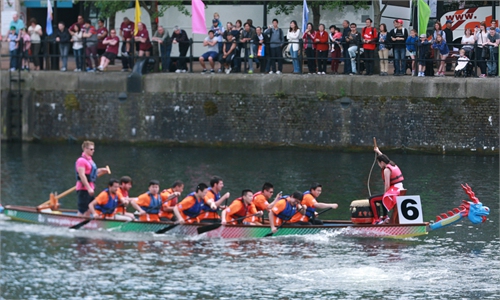The Dragon Boat Festival, or Duanwu Festival, is the first Chinese festival to be inscribed in the Representative List of Intangible Cultural Heritage by UNESCO. Apart from China, many countries and regions around the world now also observe the festival.
Among the legendary tales about the origin of the Duanwu Festival, the tale of poet Qu Yuan (about 340BC-278BC) is the most popular.
Chinese President Xi Jinping has commended Qu Yuan and his works on several occasions for the far-reaching patriotism. Celebrating the Duanwu Festival also highlights Chinese people's love for their country.
"Love of our country, the feeling of devotion and sense of attachment to our motherland is a duty and responsibility of every Chinese. It is the foundation on which young Chinese in the new era can become winners in life," Xi said.
This preamble to the Duanwu Festival is presented to you by Chen Xi, Li Yuche and Wu Jie.
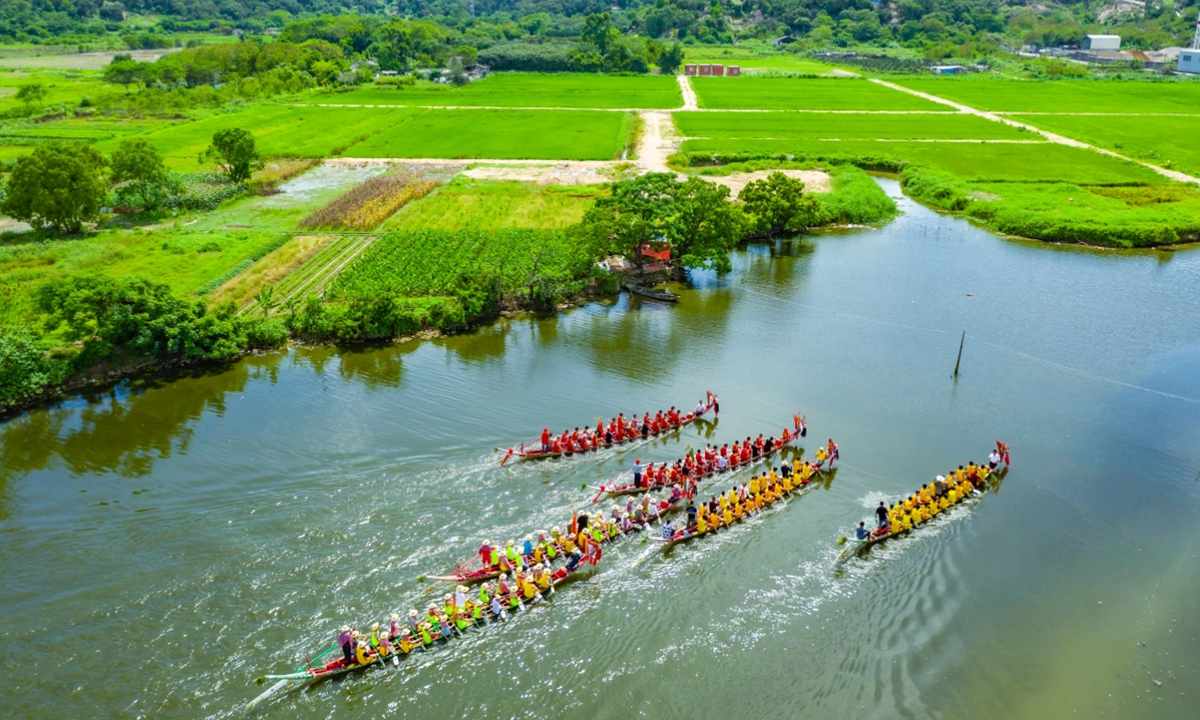
People take part in a dragon boat race. Photo: VCG
A person makes zongzi, a traditional Chinese food always eaten on the Dragon Boat Festival Photo: VCG
Washing Voile In Brook · Dragon Boat Festival
By Su Shi (Song Dynasty)
The faint sweats soak your verdant silk gently,
Tomorrow is the Dragon Boat Festival you take a bath sweetly.
All flowing creams cover on the river slightly.
The colorful strings wrap your vivid arm softly,
Little amulet hangs up green bun obliquely.
We mate love forever and grow old leisurely.
The Dragon Boat Festival, also known as Duanwu Festival, falls on the fifth day of the fifth month in the Chinese lunar calendar and on June 10 this year.
There are many versions concerning the origin of the festival, and the most influential one is related to Qu Yuan whose legacy of patriotism and perseverance has influenced the country and its people for thousands of years.
Patriotic origin
Qu was a loyal statesman and a patriotic poet in Chu, a major state in the Warring States Period (475BC-221BC). He was unjustly exiled by the king of Chu, who disregarded Qu's policy advice.
Heartbroken by the news of rivaling military forces seizing Chu's capital, Qu eventually chose to end his life, by plunging himself into the river of Miluo, currently Central China's Hunan Province.
After Qu Yuan drowned himself in the Miluo River, local people rowed out on the river to search for his body, and many boats could be seen on the wide river. Dragon boat races thus became one of the most important customs of the festival.
Throughout his lifetime, Qu wrote a great number of poems expressing his love and concern for his country and people. Perhaps his most famous line is "Long as the way is, I will keep on searching high and low," which embodies the poet's ceaseless spirit of exploration. The famous verse has been recited by generations of Chinese people.
Zheng Changling, secretary-general of the China Folk Culture Innovation and Development Center and research fellow at the Chinese National Academy of Arts, told the Global Times that traditional festivals are formed through thousands of years of inheritance. They have rich cultural significance and represent the beliefs of the Chinese people. The Dragon Boat Festival, as one of the major traditional Chinese festivals, carries ample cultural legacy, especially the spirit of patriotism that has been deeply embedded into the blood of all Chinese people and has become an important spiritual symbol of the nation.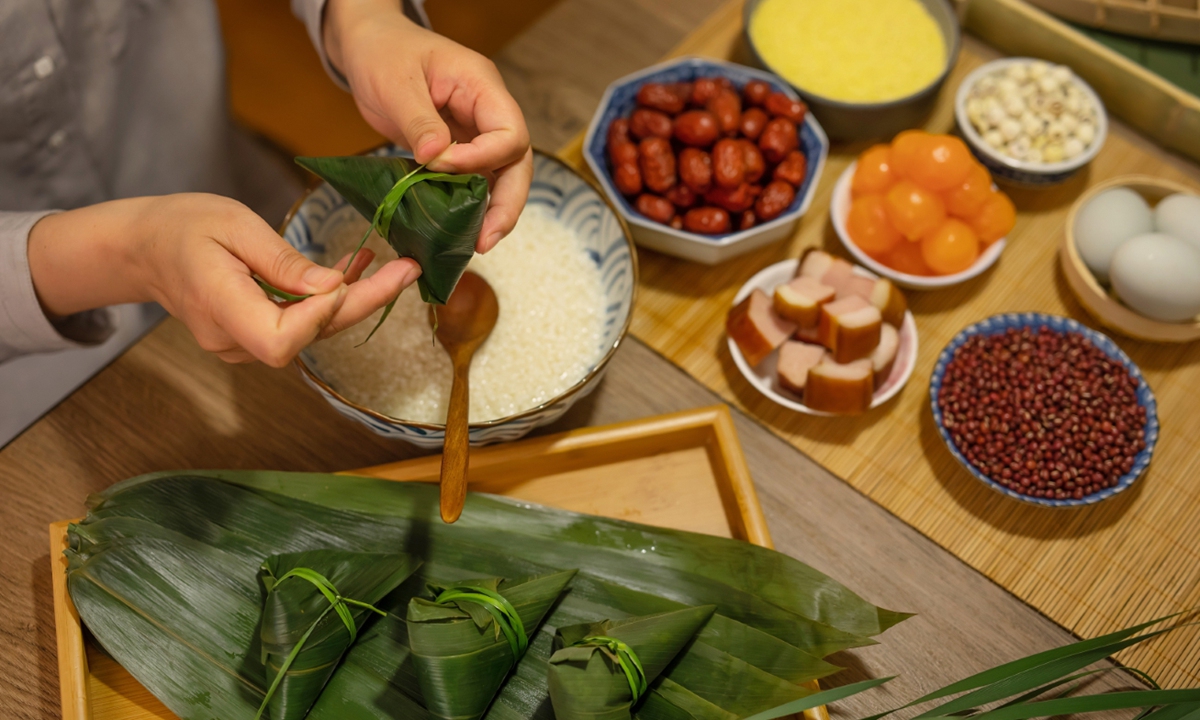
Instead of wishing people "happy Duanwu Festival," people would wish for good health and peace on the occasion as it is believed that during the midsummer, people are more likely to fall ill and epidemics can spread especially due to the prevalence of mosquitoes and flies in ancient times.
Therefore, it is the time to ward off diseases and insects by hanging mugwort and calamus and drinking realgar wine. Children often wear sachets filled with aromatic herbs to drive away evil and diseases. These sachets are often beautifully embroidered and worn as accessories.
Eating zongzi, or glutinous rice dumplings, and taking part in dragon boat races are the most iconic and widespread customs to mark the festival. In addition to China, many countries including Indonesia, Japan, Canada, Australia and the US host annual dragon boat events as part of the festival celebrations.
With 212 boats taking part, a dragon boat race held in Dao county in Central China's Hunan Province on June 2 broke the Guinness World Record for the "largest dragon boat race (team)."
Pleasant to the eye and palate
The Dragon Boat Festival's more than 2,000 years of history continues, engaging people of the young generation to find their unique ways of celebration.
Natural herbal plant the Chinese mugwort is the festival's signature. The ingredient was once commonly used by older Chinese generations for bathing during the festival season, but has now been turned into floral bouquet favored by young consumers.
The Chinese mugwort bouquet is in-trend due to it caters to the "current aesthetic taste of young Chinese," Qu Xiaoyu, a florist in Shanghai, told the Global Times.
"The plant's understated green color and its natural fragrance interpret the minimalist aesthetic trend that is especially praised in modern cities like Shanghai. Sending the bouquet to friends shows someone's warm courtesy of the festival as well as one's good taste," Qu told the Global Times.
Cultural sociologist Xu Shuming told the Global Times that the new change exemplifies that the "inherence of cultural tradition must coordinate with modern lifestyles."
Favored by China's burgeoning cultural industries, including the Chinese mugwort, the festival-related items like zongzi have been added with new creative twists.
Including the Palace Museum and National Museum of China, leading cultural museums nationwide have launched their zongzi gift boxes for celebrating the Dragon Boat Festival.
Other than promoting the traditional food, those gift boxes actually promote traditional Chinese cultural spirits embodied by the food.
Taking the one launched by National Museum of China as an example, its packaging has been designed with a replicated image of a Northern Song Dynasty (960-1127) painting. Including dragon boat racing, the painting depicts that carrying out diverse water activities has been a tradition in China since ancient times.
"Unlike reading historical books, such creative products can better engage people to wonder about the cultural narratives behind the Dragon Boat Festival as well as enhancing their cultural confidence," said Xu.
Creative products relating to the festival cover a wide range of forms to have also involved the entertainment sector. In 2021, the Henan TV launched a blockbuster gala called the Adventures on Dragon Boat Festival. Modern technologies such as the AR and VR systems were employed by the show to revive the traditional festival.
"Such new tools and narrative patterns inspire young people to pass down the country's cultural heritage," said Xu.
